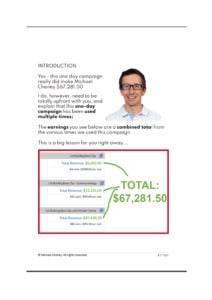This guide provides a roadmap to launching your first affiliate marketing campaign using proven search engine optimisation (SEO ) techniques tailored for those just starting out. By following these steps, you can build a solid foundation, choose the right products to promote, optimise your content, and ultimately drive more traffic and sales. With a strategic and methodical approach, you’ll be on your way to becoming a savvy affiliate marketer. Success is within your grasp if you start with the basics and allow your knowledge and experience to grow over time through testing and refinement. The journey begins here.


If you’ve been struggling online this report will open your eyes.
To launch your first campaign, choose a niche that interests you, like technology, home decor, or fitness. Select a product or service from a merchant in that niche to promote. Do some research on the offering and your potential audience to determine the best way to reach them. You’ll want to use search engine optimisation (SEO) to drive organic traffic to your affiliate links.
SEO involves optimising your website content and meta tags to rank higher in search engines like Google. Write blog posts, reviews, or how-to guides related to the product. Include your affiliate link within the content as well as in a prominent call-to-action. Use keywords in your page titles, URLs, image alt text, and content to improve search ranking. Build internal links between your content and get other sites to link to your content.
With time and effort, you can gain authority in your niche and build an audience of eager customers. Through valuable content and optimised affiliate links, you’ll start generating sales and earning commission. Congratulations, you’ve launched your first successful affiliate campaign!

Become the Internet Marketing Millionaire’s Next Apprentice!!
Choosing the Right Niche and Products to Promote
Choosing the Right Niche and Products to Promote
To have a successful affiliate campaign, you must choose a niche market and products that are in demand and appeal to your target audience. Some factors to consider when selecting a niche include:
- Your area of expertise or interest. Promoting products you are familiar with will make the process easier and more authentic.
- Competition. Look for niches with less competition to improve your rankings and click-through rates. Check how many affiliates are promoting products in that niche.
- Commission rates. Select products that offer attractive commission rates, at least 30-50% or higher of the sale price.
- Evergreen products. Promote products that are always in demand, rather than short-lived trends. Things like health, finance and self-improvement products tend to perform well.
Once you choose a niche, find reputable merchants and high-quality products to promote. Consider things like:
- Reliability and trustworthiness of the merchant
- Quality and usefulness of the product
- Attractive sales page that converts visitors into customers
- On-time commission payments
- Length of cookie (longer is better, e.g. 60-90 days)
To improve your search rankings, be sure to include important keywords in your content, internal links between your posts, and high quality backlinks from authoritative sites. Provide honest and detailed reviews of the products, with images, videos, and social proof from satisfied customers.
By following these steps, you’ll be on your way to launching a profitable affiliate campaign. But remember, success doesn’t happen overnight. Stay dedicated, continue improving your content and search rankings, and keep testing and optimising your campaigns. If you persevere, you can build a thriving affiliate business.

Keyword Research and SEO to Boost Your Affiliate Site
To drive traffic to your new affiliate site, you’ll need to optimise it for search engines like Google. Conducting thorough keyword research and implementing an effective search engine optimization (SEO) strategy is key.
Identify Relevant Keywords and Phrases
Brainstorm a list of keywords and phrases related to your niche, product, or service. Analyse search volumes and competition to determine viable options. Some tools for this include:
- Google Keyword Planner – Free tool to find keyword ideas and estimate search volume.
- SEMrush – Paid tool providing in-depth keyword research and analysis.
- Moz Keyword Explorer – Part of Moz Pro, explores keyword search volume and difficulty.
Choose keywords with a healthy search volume that your site can rank for. Include keyword synonyms and related terms throughout your content.
Optimise Your Page Content
Use your target keywords in key areas of your site like page titles, URLs, image alt text, and content headlines. Place keywords strategically in your page content at the beginning of sentences and paragraphs. However, do not oversaturate as this can seem unnatural and spammy to search engines.
Build High-Quality Backlinks
Create partnerships with relevant websites and blogs to build backlinks to your site. Guest post on industry websites, do content collaborations, and build relationships with influencers. High-authority, relevant backlinks signal to search engines that your site is a trusted resource.
Technical SEO Considerations
Ensure your site has a mobile-friendly responsive design, fast loading times, and secure HTTPs. Submit your XML sitemap to search engines and fix any broken links or 404 errors found. Optimising technical SEO factors provides a solid foundation for your affiliate site.
By conducting thorough keyword research, optimising your on-page content, building high-quality backlinks, and attending to technical SEO, you can achieve higher search rankings and drive more organic traffic to your new affiliate site. With consistent optimization, your site will gain more visibility and authority in search engines over time.
Building Links and Generating Traffic to Your Affiliate Site
To generate traffic and build authority for your affiliate site, focus on building high-quality backlinks. Backlinks are links from other websites that point back to your site. They signal to search engines like Google that your content is valuable and authoritative.
Build Links Through Guest Blogging
One of the most effective ways to build links is through guest blogging on industry-relevant websites. Identify sites in your niche that accept guest posts and pitch them article ideas that would benefit their readers. Be sure to include a short bio with a link back to your site. Over time, these links will help boost your site’s authority and ranking.
Comment on Relevant Blogs
Leaving helpful, insightful comments on blog posts in your industry is an easy way to build links. Look for recent posts on authoritative sites in your niche. Read the post and leave a genuine comment adding value to the discussion. Politely include a link back to a relevant page on your site. Make sure your link uses keyword-rich anchor text. Blog owners often allow links in comments, appreciating engaged readers.
Submit Infographics and Resources to Industry Sites
Creating useful resources like infographics, statistics roundups or ‘best of’ lists provides opportunities to build links. Submit these resources to industry publications, blogs, forums and directories. Include a link back to your site in the resource and in your author bio. Make the content highly sharable on social media to increase link and referral opportunities.
Network and Collaborate
Networking with others in your industry can lead to link building and promotion opportunities. Attend industry events to connect with influencers and bloggers. Pitch them ideas for co-created content or cross-promotion. Look for influencers open to interviewing or podcasting with you. Provide resources and link to their content in return. Build genuine relationships based on mutual benefit and interest.
Using a combination of these link building techniques consistently over time will drive more traffic to your affiliate site and help boost your search engine rankings. While link building takes work, the rewards of higher traffic and commissions can be well worth the effort.
Tracking, Optimization, and Scaling Your Affiliate Campaign
Once your affiliate campaign is live, you need to track its performance and make optimizations to scale it for the best results. Tracking your campaign involves monitoring key metrics like clicks, conversions, and commissions to see what’s working and what needs improvement.
Clicks
The number of clicks your affiliate links receive shows how much interest there is in the products you’re promoting. Monitor which links get the most clicks to determine which products resonate most with your audience. You can then emphasise those products more in your content.
Conversions
The conversion rate refers to the percentage of people who click your links and actually make a purchase. A high conversion rate means your affiliate links are effective and the products you’re promoting are appealing to your readers. A low conversion rate may indicate a poor match between your content and audience or unattractive product offers. You can test different products, links or content to raise your conversion rate.
Commissions
Tracking the commissions you earn from your affiliate links is key to measuring the success of your campaign. Higher commissions mean higher sales, indicating you’ve chosen products that strongly appeal to your readers. Monitor which links generate the most commissions so you can promote those products more prominently.
To scale your campaign, analyse the metrics to determine what’s performing best, then do more of it. Promote your top-converting products more frequently. Repurpose or refresh content that gets a lot of clicks and links. And test new products, content formats or designs to keep improving your results. Continuous optimization and scaling of your campaign will lead to greater success and higher affiliate commissions over time.
Conclusion
As you can see, launching your first affiliate marketing campaign does not have to be complicated. By following the steps outlined above focusing on keyword research, content creation, link building and tracking your results, you have the blueprint to get started. While it will take consistent effort to build momentum, stay patient and committed. With time, you can establish a successful affiliate marketing channel as a source of income. The key is simply to get started. Stop overthinking and dive in – you will learn and improve as you go. Use this guide as your roadmap but don’t be afraid to adapt the strategies to your unique situation.
